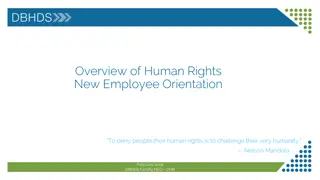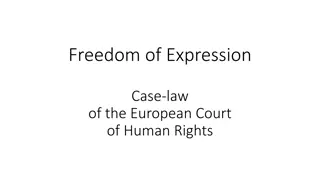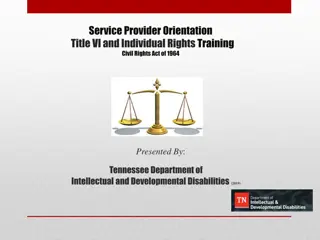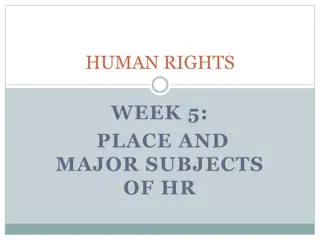Understanding Human Rights: Concepts, Characteristics, and Classification
Human rights encompass justified entitlements inherent to all individuals, ensuring fair treatment, privileges, and freedoms. This article explores the definition, nature, importance, characteristics, and classification of human rights, including proscriptive vs. prescriptive, universal vs. cultural, and individual vs. group rights.
Download Presentation

Please find below an Image/Link to download the presentation.
The content on the website is provided AS IS for your information and personal use only. It may not be sold, licensed, or shared on other websites without obtaining consent from the author. Download presentation by click this link. If you encounter any issues during the download, it is possible that the publisher has removed the file from their server.
E N D
Presentation Transcript
Concept of Human Rights Concept of Human Rights Definition, Nature/Important Concepts, Characteristics & Classification of Human Rights
What is a Right? What is a Right? A right is a justified claim or entitlement on someone or on some institution, for something which one owed. The Oxford English Dictionary (OED) has suggested threefold definition of a right: i. That which is morally or socially correct or just; fair treatment. ii. A justification or fair claim. iii. The state of being entitled to a privilege or immunity or authority to act.
What are the Human Rights? What are the Human Rights? Human rights are those rights which are inherent in human nature and without which they cannot live as human beings. Human rights and fundamental freedoms allow them to fully develop and use their human qualities, intelligence, talents and conscience and to satisfy their spiritual and other needs . (United Nations, 1987) (Or) Human rights are the internationally recognized norms for behavior of states and other persons in international law . (Stark, 1989) (Or) Human rights refer to the law, which deals with the protection of individuals and groups against violation by governments . (Buergenthal, 1988)
Nature/Some Nature/Some Important Important Concepts Rights Rights: : Concepts of of Human Human Proscriptive Vs Prescriptive Universal Vs Cultural Individual Vs Group
1) Proscriptive and Prescriptive Human Rights: 1) Proscriptive and Prescriptive Human Rights: a. Proscriptive Human Rights: Most rights that societies and their states extend or recognize as inherent are proscriptive rights that prohibit the government and often others (such as organizations and companies) from doing certain things. These are often thought of as civil rights and are also called negative rights, because they negate the legitimacy of actions by governments and others. b. Prescriptive Human Rights: Compared to proscriptive rights, prescriptive human rights are much less often recognized or enumerated by countries or in international law. Yet they exist and include the basic necessities that a government is arguably prescribed (obliged) to try to provide in order to assure certain qualitative standards of life for everyone in the community.
2. Universal and Cultural 2. Universal and Cultural- -Based Human Rights: Based Human Rights: a. Universal Human Rights: This perspective begins with the idea that rights originate from outside a society. They are granted by a deity and, therefore, may not be transgressed by humans. While the second external source, according to the Universalists, is the very nature of human existence. b. Cultural-Based Human Rights: Relativists contend that rights are relative to culture. That is, rights are the product of a society s contemporary values. Relativists, therefore, assert that in a world of diverse cultures, no single standard of human rights exists or is likely to exist short of the world becoming completely homogenized culturally. The cultural relativist s point of view also means that rights are not timeless; they can change with changing social norms.
3. Individual and Community Rights: 3. Individual and Community Rights: This issue includes the controversy over the respective rights of individuals and society. Form individualistic point of view, the rights of an individual are more important than those of the society while form the communitarian point of view, good of the community takes precedence over the good of the individual. Western states generally give importance to the individual rights whereas non-Western states prefer the community rights.
Specific Characteristics of Human Rights: Specific Characteristics of Human Rights: The human rights possess some peculiar characteristics which are as follows: a. Inherent: Because human rights are the birth rights of all human beings. People enjoy these rights simply by the reason of their humanity and, as such, they do not have to be granted or bestowed by a sovereign for them to be enjoyed. b. Inalienable: Human rights are inalienable in the sense that people cannot agree to give them up or have taken away from them, except in specific situations and according to due process. For example, the right to liberty may be restricted if a person is found guilty of a crime by a court of law. c. Universal: The dignity, worth and right to happiness of all must be recognized without question and without exception. Nobody may be discriminated against because of his race, colour, sex, language, religion, political opinion, nation, social position, property, origin or other circumstances, and everybody is endowed with all rights and freedoms.
d. Permanent: The dignity and worth of human beings does not change over time by the situation. Therefore, the human rights are guaranteed regardless of time and place, for they possess the absoluteness of being guaranteed. e. International: The guarantee of respect for human dignity and control with and the right to pursuit of happiness is stated in the United Nations Declaration of Human Rights, the Vienna Declaration of Human Rights and others, following a trend of internationalization of human rights. It was agreed by majority of the States present to observe these rights equally and with sincerity. Consequently, the guarantee of human rights, not only by the individual States but by the international community as a whole. f. Interdependent & Indivisible: All human rights are indivisible, interrelated and interdependent which means the improvement of one right facilitates advancement of the others. Likewise, the deprivation of one right adversely affects the others.
Classification of Human Rights Classification of Human Rights A. Moral Rights: A claim which is recognized by the moral sense of the people and backed by their opinion is called a moral right. Moral rights are based on our sense of morality or justice. They cover our whole conduct and refer to those actions and forbearances which is our moral duty to perform and avoid. Nevertheless, these moral rights are the sources of legal rights. What is morally recognized by a people often becomes legally so. B. Legal Rights: A legal right is a privilege enjoyed by a citizen against other citizens, associations or government, recognized by the state and upheld by its authority and laws. If it is violated or interfered with, the courts protect it by punishing those who do so or by compelling them to fulfill their corresponding duties. Legal rights, however, are of two kinds, Civil Rights Political Rights
( (i i) Civil Rights: ) Civil Rights: The rights which concern the life and property of the citizens are called civil rights. Without them civilized life is impossible. Because they provide opportunities to the citizens to seek happiness, and develop their personality. However, the content of civil rights varies with time and place. These include: a) Right to Life b) Right to Liberty and Free Movement c) Right to Property d) Freedom of Religion and Conscience e) Right to Education f) Right to Work g) Right to Contract h) Freedom of Speech i) Freedom of Association j) Right to Family Life: k) Right to Equality before Law
(ii) Political Rights: (ii) Political Rights: Political rights are those by which the citizens are able to participate in the formation of the government and in the administration of the state. These rights include: a) Right to Vote b) Right of Election to the Legislature c) Right to Public Office
Sources: Sources: Cheria, A. (2004). A human rights approach to development. Banglore: Books for Change. Kohli, A.S. (2004). Human rights and Social Work: Issues, challenges and responses. New Delhi: Kanishka Publishers. Wikipedia. (n.d.). Human rights. Retrieved February 24, 2011, from http://en.wikipedia.org/wiki/Human_rights Office of the High Commissioner for Human Rights. (n.d.). What are human rights? Retrieved February 24, 2011, from http://www.ohchr.org/en/issues/Pages/WhatareHumanRights.aspx Mazhar-ul-Haq. (-) Political Science: Theory and practice.























